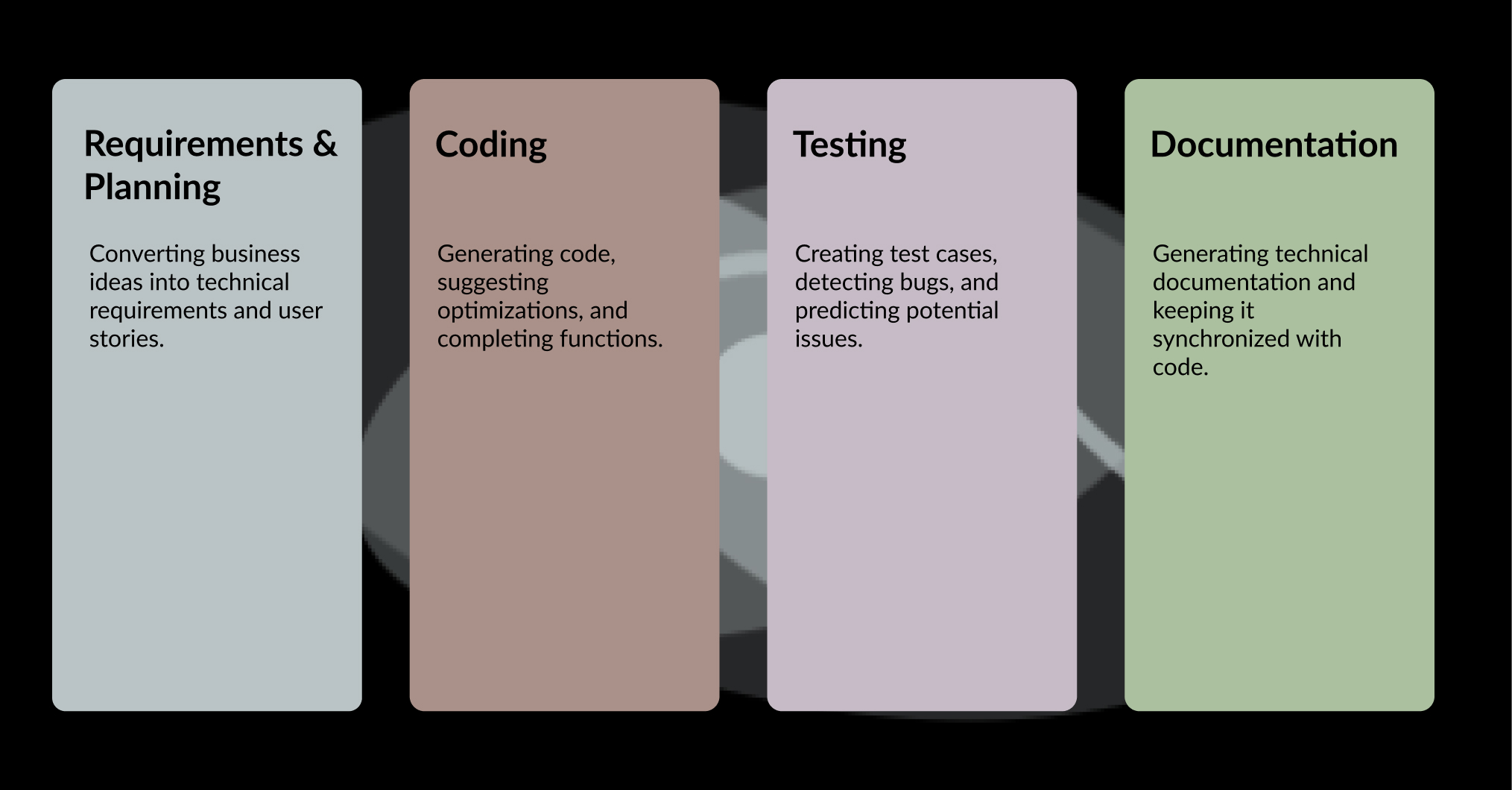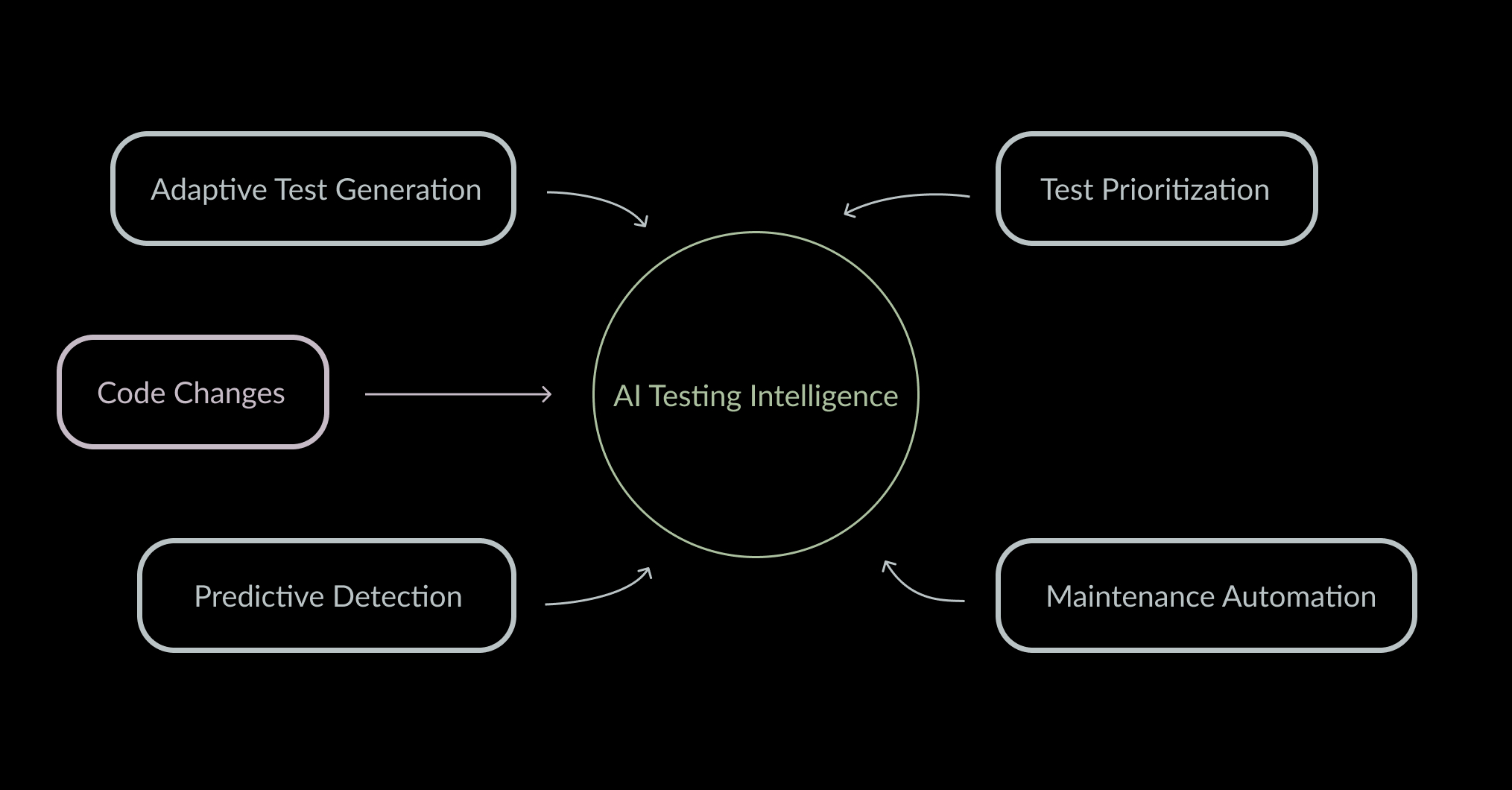10x Faster: The Evolution of AI-Driven Software Development in 2025
From code generation to bug prediction, see how AI is revolutionizing every stage of the software development lifecycle, delivering unprecedented efficiency gains.
July 7, 2025 | The Moccet Team
Key Takeaway
AI is fundamentally transforming software development by automating repetitive tasks, enhancing quality assurance, and accelerating delivery. Organizations implementing AI-driven development are seeing up to 10x faster development cycles and 20% improvements in developer productivity while reducing costs by up to 70%.
The software development landscape has undergone a remarkable transformation in the past few years. As we progress through 2025, generative AI (GenAI) and large language models (LLMs) are no longer experimental technologies but essential components of modern development workflows. This shift represents one of the most significant changes in how software is created since the advent of agile methodologies.
Based on the latest research and real-world implementations, we explore how AI is revolutionizing the entire software development lifecycle, the concrete benefits organizations are realizing, and what this means for the future of development teams.
Transformation of the Development Lifecycle
The integration of AI into software development has accelerated rapidly in 2025, fundamentally altering how applications are conceptualized, built, and maintained. McKinsey research from February 2025 estimates that generative AI could add between $2.6 trillion and $4.4 trillion to the global economy, with software development representing a significant portion of this economic impact.
AI is streamlining the entire development lifecycle by automating previously manual processes. AI excels at speed, consistency, and pattern recognition—perfect for processing data, retrieving information, and executing repetitive tasks. Humans excel at creativity, emotional intelligence, and ethical judgment, making them essential for solving complex problems and adapting to new challenges.

A comprehensive study from February 2025 documents how GenAI is particularly transforming front-end technologies, where AI and machine learning are automating routine tasks, enhancing predictive capabilities, and significantly improving user engagement experiences.
Code Generation and Developer Productivity
One of the most immediate impacts of AI on software development has been in automated code generation and developer assistance. IBM's research from October 2024 highlights how AI-powered tools use natural language processing to interpret descriptions and produce code suggestions or complete functions.
These capabilities have delivered measurable productivity improvements, with Goldman Sachs reporting a 20% improvement in developer proficiency through auto-coding implementations. Even more striking, a recent case study from May 2025 demonstrated how AI code assistance enabled a junior developer with no experience in COBOL to generate an explanation file with 95% accuracy and 54% faster than an experienced mainframe developer.
Example: Natural Language to Code
Developer prompt:
"Create a React component that fetches user data from an API and displays it in a table with sorting functionality"
AI generates:
Complete React component with API fetch logic, error handling, loading states, and sortable table implementation
For many development teams, AI assistants are now handling up to 40% of coding tasks, allowing developers to focus on higher-level architecture, complex problem-solving, and strategic decision-making. The impact is particularly pronounced in scenarios involving:
- Boilerplate code generation: AI can instantly create standardized code structures, saving hours of manual typing
- API integration: AI can generate client code for APIs based on documentation or specifications
- Complex algorithms: AI can implement challenging algorithms with optimized performance characteristics
- Cross-language translation: AI can translate code between programming languages, facilitating migrations
Beyond simply writing code, AI assistants are increasingly serving as pair programming partners, offering suggestions, identifying potential improvements, and explaining complex code to less experienced team members.
Case Study: BNY Mellon's AI Developer Transformation
Financial services company BNY Mellon reports that over 80% of its developers now rely daily on GitHub Copilot, resulting in significant acceleration of development cycles and reduction of wasted effort. The AI assistant has been particularly valuable for routine tasks like data handling, validation logic, and API implementations.
Testing and Quality Assurance Revolution
AI is significantly enhancing testing and quality assurance processes through automated bug detection and prediction. Advanced AI systems can now automatically identify bugs, vulnerabilities, and inefficiencies while suggesting appropriate fixes or optimizations.
According to May 2025 data from Deloitte, over half of global organizations have already prioritized enhanced testing and validation protocols to address AI-driven software development quality needs. The integration of AI into testing frameworks has enabled faster, more consistent delivery with fewer bottlenecks. From turning business ideas into technical requirements to generating code, tests, and documentation, it streamlines what once took hours.

Recent research also highlights AI's growing ability to predict potential errors based on historical data, enabling preventative approaches to quality assurance rather than reactive debugging. This shift from reactive to proactive quality assurance represents one of the most significant improvements in development processes.
Redefining Developer Roles and Responsibilities
Research published in June 2024 predicted that "in the next five years, we will likely see an increasing symbiotic partnership between human developers and AI". As we progress through 2025, this prediction is being realized with AI increasingly handling routine coding tasks while human developers focus on more complex, creative, and strategic aspects of software development.
The evolving developer role now includes new AI-specific skills:
- Prompt engineering: Crafting effective instructions to get optimal results from AI tools
- AI output evaluation: Critically assessing AI-generated code for correctness and security
- AI training and fine-tuning: Customizing AI models for specific development environments and codebases
- AI integration architecture: Designing systems that effectively combine AI and traditional components
"With the implementation of AI, I believe the most relevant and unique change will be improvements in the quality of products, given the ability to better analyze, synthesize information, and make recommendations."
— Inbal Shani, Chief Product Officer, Twilio
Enhanced Decision-Making and Strategic Planning
Beyond coding assistance, AI is empowering software development teams with enhanced decision-making capabilities. AI systems are increasingly serving as strategic advisors, analyzing vast datasets to identify patterns, predict outcomes, and recommend optimal approaches.
AI-powered decision support is transforming key areas:
- Architecture decisions: AI can recommend optimal architectural patterns based on requirements and constraints
- Resource allocation: AI can predict development efforts and optimize team assignments
- Technical debt prioritization: AI can identify which technical debt items have the highest impact if addressed
- Feature prioritization: AI can analyze user data to recommend which features will deliver the most value
AI-Driven Project Management Transformation
AI is revolutionizing project management by automating administrative tasks that traditionally consumed significant time and resources. Recent implementations demonstrate how AI can streamline progress tracking, scheduling, and status updates, allowing project managers to focus on strategic direction and team leadership rather than administrative overhead.
Atlassian's 2025 guide on AI in project management emphasizes how artificial intelligence can benefit all phases of project management, from establishing objectives to evaluation and reporting. These benefits extend across multiple industries, with research from December 2024 documenting AI's transformative role in risk mitigation through enhanced decision-making, resource optimization, and workflow transparency.
The Economic Impact of AI-Driven Development
Organizations implementing AI in their software development processes are reporting substantial productivity gains and efficiency improvements. Beyond the previously mentioned 20% improvement in developer proficiency at Goldman Sachs, numerous organizations are documenting similar productivity enhancements across their development operations.
McKinsey's February 2025 research emphasizes how this holistic redesign of the development process "should ultimately accelerate the process, improve product quality, increase customer adoption and satisfaction, and spur greater innovation."
Current Technology Landscape and Future Directions

Several significant technologies and trends are shaping the AI-driven development landscape in 2025:
Emergence of Agentic AI Systems
One of the most significant recent developments has been the rise of agentic AI systems. These advanced AI models can operate with greater autonomy, taking actions based on objectives rather than simply responding to specific prompts. Frost & Sullivan's March 2025 report identifies Agentic AI as one of the top growth opportunities in artificial intelligence for 2025.
Advancements in Foundation Models
Foundation models continue to advance rapidly, with Alibaba's Qwen3 model (released in May 2025) significantly narrowing the technology gap with leading US AI systems. These improvements in cost efficiency and multilingual capabilities are positioning foundation models as increasingly competitive alternatives for global enterprises.
MLOps Platform Evolution
MLOps platforms are evolving to address the growing complexity of AI implementation and management in enterprise environments. Frost & Sullivan identified MLOps platforms as a top growth area for 2025, reflecting the increasing need for robust operational frameworks to manage AI systems at scale.
Challenges and Strategic Considerations
Despite the tremendous benefits, organizations implementing AI in software development face several challenges:
Technical Integration Complexities
Research from September 2024 identifies several persistent challenges, including the complexity of AI systems, performance concerns, and integration issues. For software development teams, these integration complexities often manifest in compatibility issues with existing tools, performance overhead of AI systems, and challenges in maintaining consistency across AI-assisted and traditional development processes.
Data Quality and Bias Concerns
Data quality and algorithmic bias remain critical concerns in AI implementation. Recent research emphasizes the importance of addressing these issues to ensure AI systems perform reliably and equitably.
Workforce Evolution and Skill Development
The integration of AI into software development necessitates significant evolution in workforce skills and organizational structures. As AI systems take over routine coding tasks, developers need to develop new skills focused on AI integration, prompt engineering, and strategic oversight of AI-assisted development processes.
The Path Forward: Embracing AI-Driven Development
As AI continues to transform software development throughout 2025 and beyond, organizations that successfully integrate AI capabilities will gain significant competitive advantages. The key to success lies in approaching AI integration strategically, focusing on the following principles:
- Complementary capabilities: Use AI for tasks where it excels, while keeping humans focused on high-value creative and strategic work
- Continuous learning: Invest in ongoing training to ensure teams can effectively leverage evolving AI capabilities
- Ethical implementation: Develop governance frameworks to ensure responsible AI use in development processes
- Adaptive processes: Redesign development workflows to maximize the benefits of AI integration
The organizations that approach this evolution strategically—balancing innovation with responsibility and technical capability with human expertise—will be best positioned to thrive in this new AI-augmented development landscape.
How moccet Combines AI Development with Human Expertise
At moccet, we've built our platform around the optimal blend of AI development capabilities and human expertise. Our Coordination Engine analyzes your project requirements and assembles the perfect team of AI development agents and human experts, ensuring each component of your project is handled by the most appropriate resource. The result? Software projects delivered 10x faster at 70% lower cost without sacrificing quality. Try our free project brief generatorto see how we can transform your next development project.